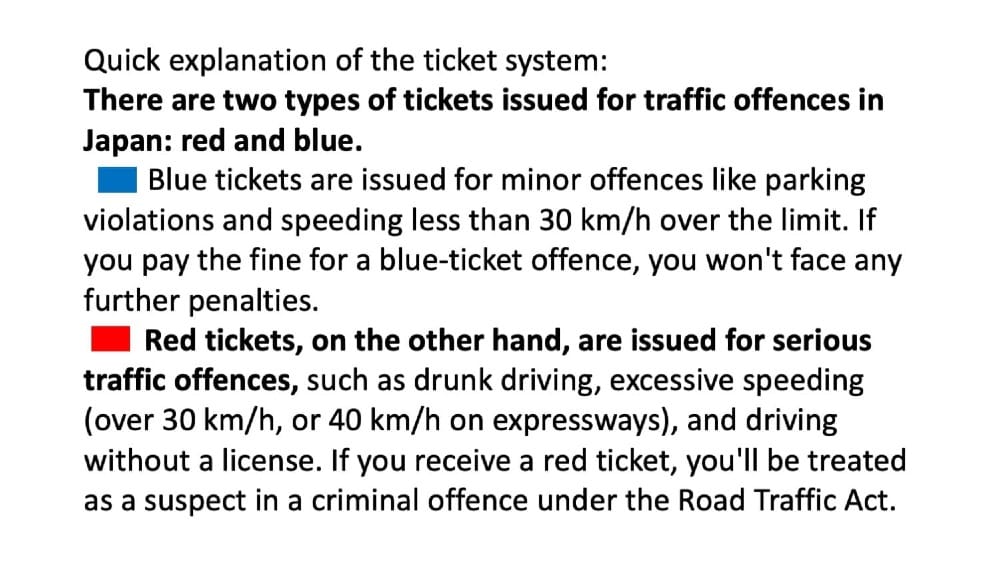Basic requirements for Permanent Residency
This series provides key considerations for applying for a Permanent Residency, or PR, in Japan. In the first article, we covered (1) the basic requirements, (2) the key changes introduced by the 2024 immigration law amendments, and (3) specific guidance for office workers and business owners.

PR in Japan: Essential tips and insights – 1/3
Some individuals may consider applying for Permanent Residency, or PR, after working in Japan for an extended period. What are the essential things to consider when applying? What are the implications for the revision this time, which will come into force within three years.? We spoke to Yasuo Tachikawa, an immigrant lawyer* with expertise in visa applications in Japan.
Summary
Be aware of 'red tickets' for traffic violations
Keep Your Receipts for Social Insurance Premiums and Tax Payments
*Mr. Tachikawa is a certified gyosei shoshi (行政書士), a legal specialist who deals not only with immigration matters but also a wide range of official documents. Given his professional experience in immigration applications, we refer to him here as an 'immigration lawyer'.
What is 'Good Conduct'?
Q. What are the conditions under which people can apply for a permanent residence permit?
Yasuo Tachikawa: To be eligible for permanent residency, you generally need to have lived in Japan continuously for 10 years with at least half of that time spent working. So, for instance, if you came here as a student and spent four years in university, you'd need to have worked for at least six years after that.
It's essential to have a stable income from your work in Japan to show you can support yourself. Basically, you need to demonstrate that you have a solid foundation for living here.
It's also crucial to fulfil all your responsibilities as a resident of Japan, such as paying taxes and pension contributions. And, of course, having a clean record is very important. Any criminal offences will obviously be a problem, but even a serious traffic violation like getting a 'red ticket' could disqualify your application.
Be aware of 'red tickets' for traffic violations
Q: Is a ‘red ticket’ specifically a suspension, for example?
YT: Yes, a license suspension or a more serious offence that requires you to appear in court would definitely be a problem. This is because it suggests you haven't met the 'good conduct' requirement for permanent residency, specifically guideline (1), and it could also fall under guideline (3)-A: not having been sentenced to a fine or imprisonment.
It's not just drivers who need to be careful, though. Cyclists can also be issued red tickets, and the Tokyo Metropolitan Police Department has been cracking down on bicycle violations since 2022. So be extra cautious and make sure you're following the rules of the road, like stopping at red lights and stop signs, riding on the correct side, and slowing down on sidewalks.

Q: To maintain 'good conduct' for a permanent residency application, is it best to avoid potentially risky situations? For example, should applicants be concerned about attending large gatherings like protests or Halloween events where things could get out of hand?"
YT: Exactly. It's wise to steer clear of anything that could lead to a police record, as that could raise concerns about your conduct and potentially jeopardise your application.

Keep your receipts for social insurance premiums and tax payments
Q) How is one's pension and tax payment history investigated?
YT: When examining PR permits, the immigration bureau will inquire about proof of proper pension payment, health insurance, and tax payments from the local authorities. Meanwhile, you must keep the recent two years' payment receipts for pensions and health insurance and five years' for resident tax.
While it's common to discard receipts, Japanese law requires you to keep them for five years*, especially if you plan to apply for permanent residency. Although many people don't keep all their receipts, it's highly recommended that you do. If you don't have them, you may need to provide a written explanation to immigration authorities, which can be a time-consuming process. Keeping your receipts organised in a file, for example, is the best way to ensure a smooth application process.
*While individuals need to keep receipts for five years, businesses generally have a longer retention period. Corporations, for example, are required to keep receipts for seven years and, in some cases, ten years.
Furthermore, it's crucial to maintain a consistent record of on-time tax payments. For resident tax, you must not have been in arrears for at least the past five years.
Employees of companies generally don't face issues as their taxes are deducted directly from their salaries. Submitting documents like your tax payment certificate, annual pension letter (ねんきん定期便 or Nenkin Teikibin), and health insurance card will suffice. However, freelancers and business owners need to be more diligent. Freelancers are responsible for their own tax payments, while business owners must ensure their company fulfils all tax obligations and social insurance payments for their employees promptly.
*Disclaimer: The information in this article is accurate as of the publication date. However, laws, regulations, and procedures are subject to change. Always check with official sources for the most up-to-date information before making any decisions.

Author's Note: This is an independent article and not an advertorial. Yasuo Tachikawa, a leading expert in visa applications, generously volunteered his time to provide valuable insights for those involved or interested in doing business in Japan.
For further assistance, his firm, Accurate Administrative Scrivener Corporation (アキュレイト行政書士法人 or Accurate Gyosei-shoshi Hojin), offers consultations in English. You can reach them directly via their contact page or official LINE account using the QR code below.







